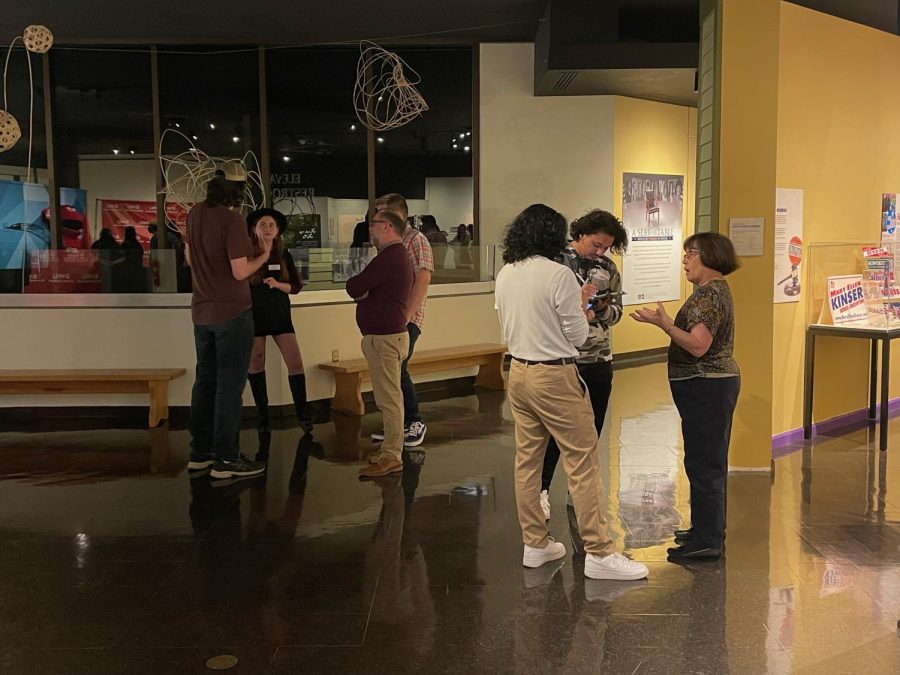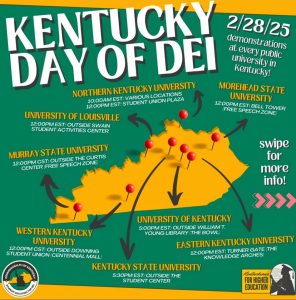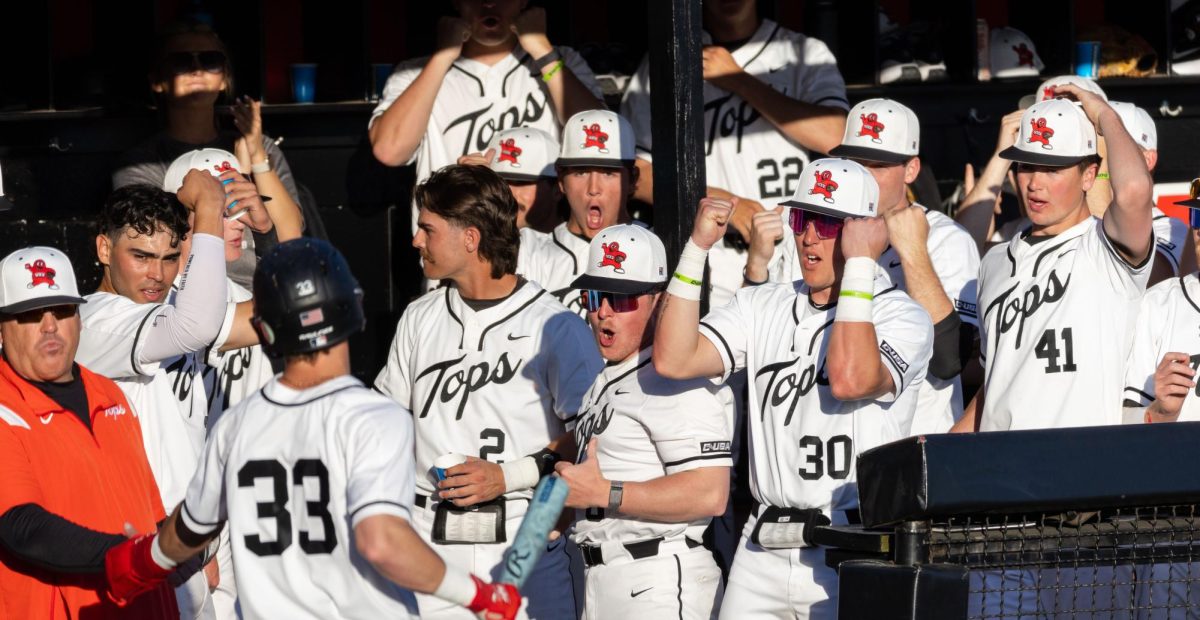‘Women’s history is history’: Kentucky Museum hosts gallery talk for three women-centered exhibits
On March 24, the Kentucky Museum, in partnership with WKU Phi Alpha Theta, hosted a gallery talk for three women center exhibits: “Kentucky Women Rising,” “Seat at the Table” and “Style &thegistofit.”
March 25, 2022
On March 24, the Kentucky Museum, in partnership with WKU Phi Alpha Theta, hosted a gallery talk for three women-centered exhibits: “Kentucky Women Rising,” “Seat at the Table” and “Style &thegistofit.”
Christy Spurlock, Kentucky Museum’s education curator, introduced the exhibits and led the audience to “Style &thegistofit” focusing on the life of Carrie Burnam Taylor.
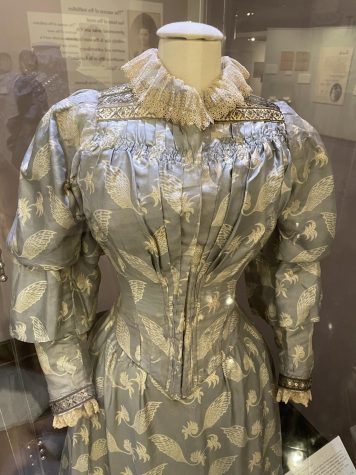
Tiffany Isselhardt explained the exhibit and briefly summarized the influence that Taylor had on the community of Bowling Green and her remarkable accomplishments as a dressmaker and business owner in the late 19th and early 20th centuries.
“Carrie Taylor is what we would consider a modern woman,” Isselhardt said. “She starts as a very well-educated woman thanks to her father’s efforts to push her through college at a time when most women don’t attend college. She starts a dress making factory in a room of her family’s home here in Bowling Green. Within the next 40 years, she created a dressmaking empire valued at what would be over $6.2 million today at the time of her death.”
What made Taylor so unique was how she encouraged other women to be successful, Isselhardt said. Most of her female employees who started out single, were expected to stay at home and become mothers once they were married. According to Isselhardt, Taylor encouraged the women to continue working so that they could be wage earners that supported their families.
“Carrie’s success starts in her family’s home, but she gets a big boost when Potter College is founded,” Isselhardt said. “She becomes the modiste for the school’s uniforms. She also became the modiste designing their party and graduation dresses.”
Taylor’s dresses gained popularity nationwide, Isselhardt said. Capitalizing on her popularity, Taylor starts publishing her own magazine and making files for her clients based on their preferences.
Taylor’s knowledge of fashion and design can be attributed to her 30 years spent traveling to Paris, New York, Amsterdam and London to attend fashion shows and learn the latest styles, Isselhardt said.
“Every single illustration in this exhibit is from the magazines that Taylor produced, which she drew by hand,” Isselhardt said. “Her reputation by this point has become so extensive that when she shows up in New York, she checks into the Waldorf, sits in the lobby, and the men come to her. The men bring trunks of garments, of fabrics, of trimmings, and say ‘what do you want?’”
In 1917, Taylor died from complications of asthma, Isselhardt said. Although Taylor’s husband and son tried to keep the business running, the business failed without her.
“From the doll clothes and the quilts that were made from scraps of fabric from her factory, to the lives of over 300 women who worked with her day in and day out, Taylor truly left a legacy for Bowling Green,” Isselhardt said.
The dresses in the museum’s collection all date back from 1894 to 1915, making them over 100 years old, according to Sandy Staebell, collections curator for the Kentucky Museum.
After allowing the audience time to explore the “Style &thegistofit” exhibit, Spurlock led the audience to the “Kentucky Women Rising” and “Seat at the Table” exhibits, which were inspired by the 100th anniversary of the 19th amendment that granted women the right to vote.
“Politics, often we think, is sort of a man’s game, but that’s not true,” Staebell said in her opening remarks on the two exhibits. “Women have been involved in politics here in Kentucky for a long time, they just weren’t always visible because they were not necessarily the ones running for office.”
Looking into the Rather-Westerman Collection for womens political memorabilia, the Museum picked pieces for the exhibit that would “reflect authoritative offices that women were running in,” according to Staebell.
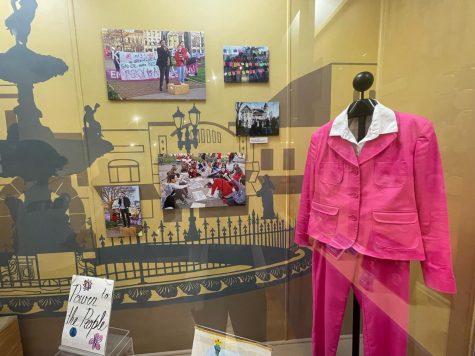
The “Kentucky Women Rising”exhibit includes political memorabilia such as campaign signs, buttons, stickers and nail files. The exhibit features information about the waves of feminism, and the first women to hold political positions in Kentucky.
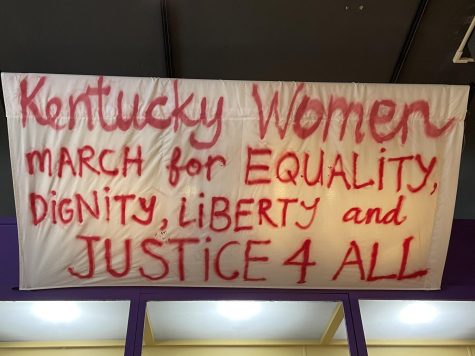
The exhibit also focuses on the impact that the 2016 election had on politics.
“The 2016 election, regardless of your political persuasion, got a lot of people interested in the election and in the post-election results,” Staebell said. “There was a lot of activism by individuals here in this area, here on this campus, so we developed this last section that had to do with the election of President Trump, the Women’s March the day after and then some subsequent marches.”
The “Seat at the Table” exhibit features eleven women in kentucky who have held a political office including Mary Elliott Flanery, Pearl Carter Pace, Thelma Stovall, Amelia Moore Tucker, Georgia Davis Powers, Martha Layne Collins, Anne Northup, Crit Luallen, Jenean Hampton, Allison Ball and Patti Minter.
“Women’s history is history,” Spurlock said. “We’re not just some side note in the textbooks. There are all these amazing women out there that so many of us have never heard of.”
Hunter Hartlage, co-president of Phi Alpha Theta, has an internship at the Kentucky Museum where he helps organize and moderate events, put together exhibits and collect art.
“I get to see a lot of different aspects of museum work, which I really enjoy,” Hartlage said. “The women’s history exhibits are very important. When you have artifacts or things that you can see and study, you are able to piece together those histories again. It’s an important part of the human experience that for so long has not even been allowed to be a part of the story.”
Kirsten Homer, a history and communications double major, has been working for the museum for two semesters as a docent.
Hartlage and Homer, members of the history club, worked together to organize the gallery talk.
“Women’s history is very personal for me as a woman and a history major,” Homer said. “I love history, but a lot of times women’s roles in things get left out. I think it is really important to emphasize how recent women’s involvement in politics is and how hard that it was fought for.”
To learn more about the Kentucky Museum and the women’s history exhibits visit https://www.wku.edu/kentuckymuseum/.
News reporter Madison Carter can be reached at madison.carter312@ topper.wku.edu.



